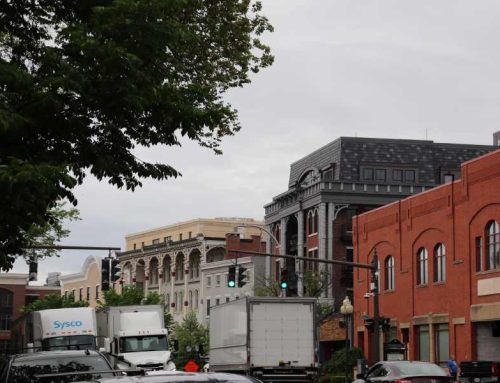![]()
Below is the text of a letter we sent to the Saratoga Springs City Council regarding the Liberty Affordable Housing, Inc. application for a zoning amendment for a parcel on Crescent Avenue and Jefferson Street.
September 1, 2022
Dear Mayor Kim and Commissioners:
We are writing this letter to express concern about the Liberty Affordable Housing, Inc. application for a zoning amendment for a 30.27 acre parcel on the corner of Crescent Avenue and Jefferson Street.
As you may know, Sustainable Saratoga has long advocated for workforce housing in Saratoga Springs. We encourage the Council to develop a comprehensive, proactive, and creative strategy to meet the housing diversity and affordability needs of our community, and would be happy to work with the Council toward this goal. For years, Sustainable Saratoga has recommended workable alternatives, such as inclusionary zoning and the conversion of carriage houses into apartments. We also vigorously support development patterns in our city that conform to the established sustainable development principles embodied in our city’s Comprehensive Plan. We do not believe that these goals are mutually exclusive.
We have reviewed the application for a zoning amendment filed by Liberty, as well as a similar 2018 application for a zoning amendment and subsequent unfavorable advisory by the city Planning Board, and believe that the current application is flawed both procedurally and substantively. The Council should, at the outset, require the applicant to address the procedural flaws before accepting the application through a vote on “merit for review,” at least until the significant procedural errors are rectified.
There are two major procedural errors. First, the petition falsely states that the map amendment is compatible with the 2015 Comprehensive Plan. It also states that the proposed Urban Residential-4 (UR-4) zoning is consistent with the adopted Comprehensive Plan. However, page 55 of the 2015 Comprehensive Plan states that all zoning must conform to the uses and density requirements set forth in the Future Land Use Map. When areas are to be rezoned, the uses and densities permitted within the zoning district must be compatible with the ranges presented in that land use category in the Comprehensive Plan. The property is clearly designated as Residential Neighborhood-1 on page 65 of the Future Use Land Map. Such zoning allows a maximum density of 3.5 units per acre. The proposed UR-4 zoning, which has a maximum density of 14.5 units per acre, is not compatible with the Comprehensive Plan. Therefore, a request to amend the Comprehensive Plan map must accompany the application. No such request accompanied the Liberty petition.
Second, the SEQRA form attached to the rezoning petition fails to analyze the full set of uses that are permitted under UR-4 zoning. If the City Council were to rezone this 30-acre parcel to UR-4, many other uses in addition to housing would be permitted. These include private schools, hotels (20 rooms or less), lodging houses, adult care facilities, children’s homes, community centers, day care facilities, churches, social clubs, shelters, rooming houses, and other uses not permitted in the existing zone, as well as higher density residential units. The SEQRA form needs to evaluate the potential environmental impacts from the full list of uses allowed by the UR-4 zoning, not just for a housing development. The SEQRA form needs to be amended to address that omission.
Because of these two procedural errors, specifically, the failure to include a request to amend the Comprehensive Plan map and the incomplete SEQRA assessment, the application should not be advanced through a “merit for review” vote.
In addition to the procedural flaws, we also have concerns about the Liberty zoning amendment application on substantive grounds.
Our first substantive concern about the application is that the City Council does not have the authority to specify that only affordable housing can be built on the property if it is rezoned to UR-4. To try to do so would constitute “contract zoning”, which is not permitted by state law. The City Council is being asked to rezone the property, hoping that it will be developed as affordable housing but, in reality, opening this parcel to any UR-4 development. If the applicant fails to obtain federal or state funding for affordable housing or abandons the project for another reason, the UR-4 zoning would allow the applicant to sell or use the property for any of the other UR-4 uses allowed by the Unified Development Ordinance. Although a restrictive deed could perhaps restrict the property for use only as affordable housing, no such deed has been proposed by Liberty.
Second, while Liberty may intend to apply for federal funding for affordable housing if they are granted the requested zoning amendment, there is no guarantee that they will receive such funding. If the project does not receive federal funding, the zoning change to UR-4 would allow the property to be developed in any manner permitted in that zone. By amending the zoning the city loses its ability to control development on that parcel. It cannot rescind the zoning change if the applicant fails to obtain federal funding, or make the change conditional on the developer obtaining federal funding for affordable housing. Once the parcel is rezoned, if the applicant does not receive the affordable housing grants it seeks, the parcel likely will be developed to its most financially lucrative potential within UR-4 parameters.
Third, the allowable densities proposed in the amendment are inconsistent with the development
of much of the surrounding area. The project parcel’s current zoning designation allows primarily for the development of low-density, single-family residential neighborhoods, applying conservation design standards. The parcel is adjacent to the city’s Greenbelt and to forested state parkland. While large multi-story apartment buildings might be appropriate in one of our downtown Transect zones, they are inappropriate on this site, which is adjacent to lower intensity development and which contains significant protected wetlands.
Finally, the Liberty application is not compatible with the city’s existing land use policy. This is a proposal for Comprehensive Plan and UDO amendments to accommodate a single incompatible use. Saratoga Springs’ current Comprehensive Plan was created through a long collaborative effort by a large committee appointed by the City Council. The planning process spanned many months and included substantial public participation. Changes to the Comprehensive Plan should only be made through the same process, involving the entire community in a comprehensive look at the future development of the entire city. Amendments to the Comprehensive Plan should be made sparingly and judiciously, and not for the purpose of promoting a single application.
Looking at the bigger picture, we strongly believe there are better ways to address the city’s affordable housing needs than the apartment complex proposed by Liberty. Large developments dedicated exclusively to “workforce housing” have the undesirable consequence of segregating the city by income, rather than integrating such housing into existing neighborhoods and new mixed-income developments. That said, we are willing to consider supporting less diverse housing projects that help address this major need but only if they are in a location that’s consistent with the Comprehensive Plan’s “city in the country” vision that is responsible for so much of this City’s success and uniqueness.
We hope the City Council will carefully review this proposal and consider the broader implications of the proposed amendments.
Thank you for considering our comments.
Sincerely,
![]()
Dianna Goodwin and Laura Rappaport, Co-Chairs
Read more about our Land Use and Urban Planning work




